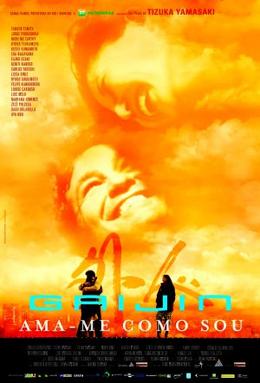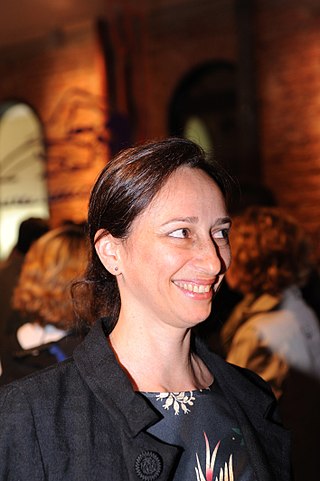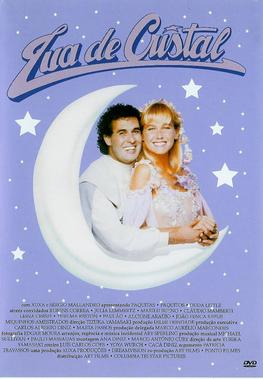Tizuka Yamasaki | |
|---|---|
 | |
| Born | Tizuka Yamasaki 12 May 1949 Porto Alegre, Rio Grande do Sul, Brazil |
| Nationality | Brazilian |
| Occupation(s) | Film and television director |
Tizuka Yamasaki (born May 12, 1949) is a Brazilian film director. [1]
Tizuka Yamasaki | |
|---|---|
 | |
| Born | Tizuka Yamasaki 12 May 1949 Porto Alegre, Rio Grande do Sul, Brazil |
| Nationality | Brazilian |
| Occupation(s) | Film and television director |
Tizuka Yamasaki (born May 12, 1949) is a Brazilian film director. [1]
Born in Porto Alegre, at the age of 2, Tizuka moved back with her Japanese immigrants parents to the city of Atibaia, in the state of São Paulo. In her teenage years, Yamasaki moved to São Paulo city for an undergraduate course in architecture, though she changed her mind before her admission and moved to Brasília to study cinema instead. Yamasaki finished college in Rio de Janeiro, where she started her professional career.
Yamasaki was one of the first women filmmakers in Brazil who achieved a successful and longstanding career. She and her peers learned filmmaking by working on the sets of well-established Cinema Novo directors. [2] Yamasaki worked as director assistant with Nelson Pereira dos Santos and Glauber Rocha. Yamasaki challenged the norms of Cinema Novo by increasing both the representation of women and the awareness of issues affecting women in Brazilian society. [3] Her film style focuses on historical subjects and she uses the genre of melodrama to reconstruct Brazilian politics, history and culture.
Yamasaki established herself as one of the most important film directors of the 1980s. Her films discussed sexuality and traditional gender roles more openly within Brazilian cultural identity. Yamasaki initiated a “cinema of emotion” to comment on Brazil's past and rework female figures’ experiences in Brazil's history. [4]
She's also a director of telenovelas and TV series. Yamasaki began her work with auteur-style films, then transitioned to work in television. Yamaski continued to reference auteur cinema within her TV series productions. Yamasaki's work challenged glamorous Brazilian television by focusing on natural and realistic images. [5]
During her career, especially during the final years of the dictatorship, Yamasaki has suffered censorship and funding issues with her films. In response to these challenges, Yamasaki established her own production company in 1976, Centro de Produção e Comunicação (Production and Communication Center). [6] This enabled her to bypass government regulations and become eligible for production funding from Embrafilme.
Tizuka gained some critical acclaim with her 1980 film Gaijin, Os Caminhos da Liberdade (aka Gaijin, a Brazilian Odyssey), a story about Japanese immigration to Brazil. [7] She has, however, been criticized for directing overly commercial movies with the children TV show hostess Xuxa. In 2003, she completed Gaijin 2 as a sequel to her debut film.

José Dumont is a Brazilian TV and movie actor, best known for his role as the family father in Behind the Sun, an award-winning film of director Walter Salles. More recently, he has been lionised for his role as the slick artist agent-entrepreneur in the movie 2 Filhos de Francisco.
Tata Amaral is a Brazilian director, writer, producer and actress. She has won various awards across South America, including 'Best director' and 'Best film'.

The 33rd Cannes Film Festival was held between 9 and 23 May 1980. The Palme d'Or went to the All That Jazz by Bob Fosse and Kagemusha by Akira Kurosawa.

Juliana Riva Baroni is a Brazilian actress and singer. She is best known for being a paquita for five years and for her leading role on the Rede Bandeirantes telenovela Dance, Dance, Dance.
Ana Carolina is a Brazilian film director and screenwriter. She directed seven films between 1969 and 2003. In 1978, she was a member of the jury at the 28th Berlin International Film Festival. Her 1982 film Heart and Guts was screened in the Un Certain Regard section at the 1982 Cannes Film Festival.
Diler & Associados is an independent film production company specializing in all aspects of film production, from initial script development all the way through to final distribution. D&A’s main goal is to provide content of an international standard, mainstream appeal and with franchise potential.

Gaijin 2: Love Me As I Am is a 2005 Brazilian drama film directed by Tizuka Yamasaki. It is the sequel of Gaijin: Roads to Freedom (1980), also directed by Yamasaki.

Laís Bodanzky is a Brazilian film director. She is best known for Brainstorm, a film about the situation in mental institutions in Brazil.

Gaijin: Roads to Freedom, also known as Gaijin, a Brazilian Odyssey, is a 1980 Brazilian drama film, the debut film of director Tizuka Yamasaki.

Carmen Santos was a Portuguese-born Brazilian actress and film producer. Santos began acting at the age of fifteen, and started producing films from 1930 onwards with Blood of Minas Gerais. She founded her own film studio Brasil Vita Filmes in Rio de Janeiro. Santos directed the 1948 film Minas Conspiracy, in which she also starred.
Lael Alves Rodrigues was a Brazilian film director, producer, editor and screenwriter.

Lua de Cristal is a 1990 Brazilian romantic comedy film directed by Tizuka Yamasaki, and starring Xuxa Meneghel.

Xuxa Requebra is a 1999 Brazilian musical romantic comedy film directed by Tizuka Yamasaki, with final script by Evandro Mesquita. His cast includes brazilian singer, TV host and actress Xuxa Meneghel, singer Daniel and Elke Maravilha as protagonists of the story, as well as the participation of countless Brazilian artists such as Carla Perez, Luciano Huck and Fat Family.

Xuxa Popstar is a 2000 Brazilian musical romantic comedy film directed by Paulo Sérgio de Almeida and Tizuka Yamasaki with screenplay by Vivian Perl and Wagner de Assis. The cast includes Xuxa Meneghel, Luigi Baricelli, Marcos Frota and Sílvia Pfeifer, as well as musical numbers with Os Travessos, KLB and Deborah Blando.

Xuxa e os Duendes is a 2001 Brazilian fantasy musical adventure children's film directed by Paulo Sérgio de Almeida, Rogério Gomes and Márcio Vito with a screenplay by Vivian Perl and Wagner de Assis. Based on personal experiences lived by Brazilian TV host Xuxa Meneghel. It contains in his cast Xuxa Meneghel, Guilherme Karan, Debby Lagranha, Leonardo Cordonis, Gugu Liberato, Ana Maria Braga, Emiliano Queiroz, Angélica, Wanessa Camargo.

Xuxa em O Mistério de Feiurinha is a children's film directed by Tizuka Yamasaki and starring Xuxa Meneghel. It is adapted from the book O Fantástico Mistério de Feiurinha, written by Pedro Bandeira.

Caminho das Índias is a Brazilian telenovela produced by TV Globo. It ran from 19 January to 11 September 2009. Caminho das Índias is a story of contrasts which examines the differences in beliefs and values of the Eastern and Western world.

This is a complete filmography of Xuxa, a Brazilian singer, actress, and television presenter.

Lúcia Murat is a Brazilian filmmaker.

Xuxa e os Duendes 2: No Caminho das Fadas is a 2002 Brazilian fantasy adventure children's film directed by Paulo Sérgio de Almeida, Rogério Gomes and Márcio Vito and written by Vivian Perl and Wagner de Assis. It is the sequel to Xuxa e os Duendes (2001). Xuxa Meneghel, Ana Maria Braga, Debby Lagranha, Emiliano Queiroz, Tadeu Mello and Guilherme Karan reprise their respective roles from the first film, joined by Luciano Szafir, Betty Lago, Vera Fischer, Deborah Secco, Thiago Fragoso. In this sequel, Kira (Xuxa), the elf of light, is in charge of saving her friends and mankind from a curse that would petrify the hearts of lovers and end love on the face of the Earth.